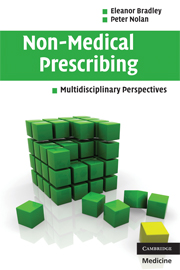Book contents
- Frontmatter
- Contents
- List of contributors
- Foreword
- Preface
- Acknowledgements
- Introduction
- 1 Medicines and prescribing – past and present
- 2 Nurse prescribing – impact, education and sustainability
- 3 Nurse prescribers: from 2003 to 2006
- 4 Nurse prescribing experienced
- 5 Nurse prescribing observed
- 6 Pharmacists and prescribing
- 7 Professions allied to medicine and prescribing
- 8 Conclusions
- Index
- References
6 - Pharmacists and prescribing
Published online by Cambridge University Press: 22 August 2009
- Frontmatter
- Contents
- List of contributors
- Foreword
- Preface
- Acknowledgements
- Introduction
- 1 Medicines and prescribing – past and present
- 2 Nurse prescribing – impact, education and sustainability
- 3 Nurse prescribers: from 2003 to 2006
- 4 Nurse prescribing experienced
- 5 Nurse prescribing observed
- 6 Pharmacists and prescribing
- 7 Professions allied to medicine and prescribing
- 8 Conclusions
- Index
- References
Summary
Introduction
This chapter is based largely on the findings from a small-scale study conducted in the West Midlands in early 2005 to explore the experiences and attitudes of seven pharmacist supplementary prescribers (PSPs), their general practitioner (GP) colleagues and practice nurses. All the pharmacists had been qualified as prescribers for a minimum of 6 months at the time of the study and were based in GP practices. Only one of the pharmacists had not yet prescribed. Focus groups and interviews were conducted to explore their readiness to prescribe, their relationships with other practice staff, the feedback they had received from patients, their assessment of their contribution to patient care and any continuing development needs.
The main types of pharmacy practice in the UK comprise community pharmacists (‘chemist shop’), hospital pharmacists, pharmacists based in GP practices, Primary Care Trust (PCT)-employed pharmacists (prescribing advisors), industrial pharmacists and academic pharmacists. Practice-based pharmacists (PBPs) are employed to improve the quality and cost-effectiveness of prescribing by offering prescribing advice. In some GP practices, PBPs may also be part of the clinical team and run clinics. Pharmacist supplementary prescribing (PSP) commenced in the UK in 2004, and the sample of PBP prescribers described in this study is made up of the ‘pioneers’. As such, the characteristics and practice of these individuals may be different from those of the pharmacy profession as a whole.
- Type
- Chapter
- Information
- Non-Medical PrescribingMultidisciplinary Perspectives, pp. 113 - 132Publisher: Cambridge University PressPrint publication year: 2008



